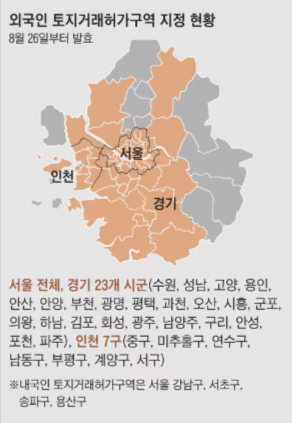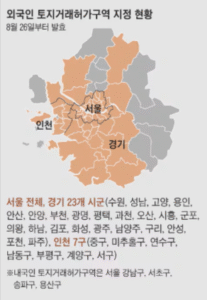New Rules for Foreigners Buying Property in Korea
From August 26, 2025, non-resident foreigners began facing new restrictions when purchasing residential property in the Seoul Metropolitan Area (SMA). South Korea’s Ministry of Land, Infrastructure, and Transport (MOLIT) initiated the change to reduce speculative property buying by non-residents in order to stabilize the nation’s housing market.
Foreign investors and those planning to relocate to the Republic of Korea need to understand these new regulations, and the legal experts at Pureum Law Office (PLO) are to clearly explain these changes.
Which Areas Are Affected?
The new regulations apply to the following locations:
- Every district in Seoul City
- 7 districts in Incheon: Jung-gu, Michuhol-gu, Yeonsu-gu, Namdong-gu, Bupyeong-gu, Gyeyang-gu, Seo-gu
- 23 cities and counties in Gyeonggi Province: Suwon, Seongnam, Goyang, Yongin, Ansan, Anyang, Bucheon, Gwangmyeong, Pyeongtaek, Gwacheon, Osan, Siheung, Gunpo, Uiwang, Hanam, Gimpo, Hwaseong, Gwangju, Namyangju, Guri, Anseong, Pocheon, and Paju
These regions are collectively referred to as the SMA, where real estate purchases by non-Koreans have increased significantly in recent years.
Who Is Subject to the New Restrictions?
The new policy applies to non-resident foreigners, including:
- Individuals not holding South Korean nationality
- Foreign corporations, governments, and organizations
- Foreigners who do not intend to reside in Korea
In short, foreigners who do not plan to live in Korea cannot buy residential property in the restricted areas.
What Are the Conditions for Permission?
To purchase property in these regions, non-resident foreigners must:
- Obtain approval from the local district or city office;
- Move into the property within 4 months of purchase; and
- Maintain residence for at least 2 years
What Happens If You Violate the Rules?
- Local governments can issue a compliance order within 3 months of identifying any violation
- If you fail to comply, a fine of up to 10% of the purchase price may be imposed
- The fine can be repeatedly enforced until the issue is resolved
Additional Oversight
To strengthen enforcement, Korean authorities now also require:
- More comprehensive documentation, including a funding source report and proof of immigration or visa status
- Enhanced coordination with the Financial Intelligence Unit (FIU) and National Tax Service if funds are deemed suspicious
- Potential on-site inspections, and in some cases, permit cancellation
Pureum Law Office Can Help
Buying real estate in the Republic of Korea as a foreigner involves more than just signing a contract, it requires a clear understanding of legal obligations and approval processes. PLO specializes in helping international clients confidently navigate South Korea’s complex real estate regulations. Please contact us today, let us help.









